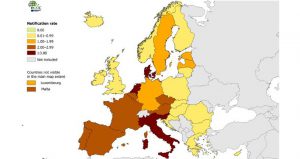Legionnaires’ outbreak in Poland

- 25 October 2023
-
 Fergal MacErlean
Fergal MacErlean
Share article:
The probable source of a legionella infection in Rzeszow, south-eastern Poland, that killed 25 and infected 165 people in August was from hot water installations in residential buildings and apartments, according to a Podkarpackie Provincial Sanitary Inspector.
Head Inspector Adam Sidor was reported as saying that there were favorable conditions for the development of the bacterium in the city’s water supply. Sidor also said that the weather conditions in July and August, characterised by high humidity combined with high air temperature, were also significant and could have led to water aerosols containing the bacteria. Earlier this month the sanitary inspector said that the epidemiological inquiry had not yet been completed.
Outbreak
The first cases took place on July 30, with the peak of cases being recorded between August 12-16. At that time the Polish health ministry said, in an online post, “The hypothesis of the municipal water supply network as the source of infection is being verified.” The authorities in Rzeszow, a city of nearly 200,000 residents, some 100km from the Ukraine border, carried out additional disinfection work. By September 26, when the Poviat Sanitary and Epidemiological Station in Rzeszow published the last announcement, 165 infections with Legionella pneumophila were confirmed, most in Rzeszow – 113 and in the wider district – 38. Other cases of legionellosis concerned other districts. The fatalities included 12 women and 13 men, aged 53-98. All these people were also treated for other diseases.
Rumours
Professor Robert Flisiak, an epidemiologist who leads the Polish Association of Epidemiologists and Infectiologists, told the New York Times that there was no evidence that someone had sought to cause the outbreak as was rumoured due to Rzeszow’s strategic location as a hub for the Western response to Russia’s invasion of Ukraine. “The actual number of registered cases in the last two weeks is what we usually record in two years,” Professor Flisiak told the newspaper. But the number of cases in Poland was still small compared to regular outbreaks in other European countries, he added.
Investigation continues
The District Prosecutor’s Office in Rzeszow is conducting an investigation which is expected to last until the end of November, but will probably be extended. No one has been charged. Documentation has been requested from the Poviat Sanitary and Epidemiological Station, the Rzeszow Municipal Water and Sewage Company and hospitals which dealt with infected victims.
Legionellosis
Legionnaires’ disease, a severe form of pneumonia caused by the Legionella bacteria, has shown a significant surge within the European Union and the European Economic Area (EEA) in 2021, with over 10 700 cases reported and 704 known fatalities. The disease is usually spread by breathing in airborne water droplets — from fountains or long-disused showers — rather than through drinking water. Most healthy people exposed to the bacteria do not become sick, but the risk is higher among the elderly and people with weak immune systems.
Highest risks in Europe
According to a report of the European Centre for Disease Prevention and Control (ECDC) published in July the EU/EEA witnessed the highest annual notification rate of Legionnaires’ disease to date, with 2.4 cases per 100,000 population, with four countries – Italy, France, Spain, and Germany accounting for 75% of all reported cases. Males aged 65 years and above were the most affected group, with a rate of 8.9 cases per 100,000 population. In 2019 the risk of getting ill was the highest in Denmark, The Netherlands, Italy and Slovenia.













